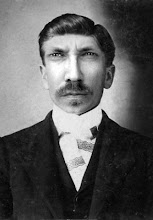
Some faces are made for cinema. Expressive from nearly any angle, alive in repose, they draw the eye no matter where they are on the screen. Some of the most cinematic faces are made most peripheral by filmmakers, belonging to what Hollywood calls character actors, a term which basically identifies people who have big chemistry on screen but don't fit into a specific, narrowly defined, marketable profile and couldn't carry a picture and therefore are delegated to the background or come in sideways, side-"kicks" like Thelma Ritter, who insinuated herself memorably into many a mise en scene by wisecracking from outside the established perimeters of the two shot.
Kristen Schaal has a face which pulls its own weight amidst what is already an unusually strong ensemble cast of character actors. She plays Mel, the number one fan on
Flight of the Conchords, a show which suits her style perfectly. Her role is all about making her fellow characters and the audience uncomfortable and it makes perfect sense she won the Andy Kaufman Comedy Award, because she excels at this kind of comedy. Her baby girl voice works in concert with silver dollar sized eyes to make the most inane bit of dialogue sound remarkably obscene. The shape of her face is straight out of Dust Bowl Dorothea Lange, an impression reinforced by what has started to seem like a trademark bob. Any other hairstyle would seem wrong on her, though that might just increase the effects of her awkward comedy.
She often steals scenes in
Flight of the Conchords. She gives the sense something else has happened, insinuating with those eyes and that curled upper lip, which disappears when she smiles, that something lascivious is or might be going on. Her performance has the reckless quality of Sandra Bernhard's performance in Scorcese's
King of Comedy. You feel she has nothing to lose and might do anything. If the camera moves a little to the left or right, she might cock-block it, killing its easy seduction game. She might not know what to do with your attention once she gets it, but she's fearless enough to wing it. Her ancestors are Carol Kane, Judy Holliday, Kaufman, Bernhard, and Judy Greer, a distant but related cousin, more aggressive in her sexual energy but just as off kilter in means.






